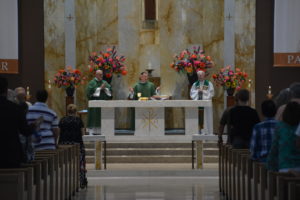The Pope on Blessed Oscar Romero: his impact is still felt in our time
By VISarchive 02
Vatican City, 30 October 2015 (VIS) – This morning five hundred pilgrims from El Salvador, in Rome to give thanks for the beatification of the bishop Oscar Arnulfo Romero, met with the Holy Father in the Paul VI Hall. The Pope defined the Salvadoran bishop martyr as a “good pastor, full of love for God and close to his brothers who, living the dynamism of the Beatitudes, gave his life in a violent way while celebrating the Eucharist, the supreme sacrifice of love, sealing with his own blood the Gospel that he announced”.
“From the very beginning of the life of the Church, Christians have always believed that the blood of martyrs is a seed for Christians, as Tertuliano said. Today too, in a dramatic way, the blood of a great number of Christian martyrs continues to be shed on the field of the world, with the certain hope that will bear fruit in a rich harvest of holiness, justice, reconciliation and love of God. But we must remember that one is not born a martyr. Archbishop Romero remarked, ‘We must be willing to die for our faith, even if the Lord does not grant us this honour. … Giving life does not only mean being assassinated; giving life, having the spirit of martyrdom, means offering it in silence, in prayer, in the honest fulfilment of one’s duty; in this silence of everyday life, giving life a little at a time’”.
“Indeed, the martyr is not someone relegated to the past, a beautiful image that adorns our churches and which we recall with a certain nostalgia. No, the martyr is a brother, a sister, who continues to accompany us in the communion of saints and who, united with Christ, does not ignore our earthly pilgrimage, our sufferings, our anxieties. In the recent history of this beloved country, the witness of Msgr. Romero has joined that of the other brothers and sisters … who are a treasure and well-founded hope for the Church and for Salvadoran society. The impact of his commitment can still be felt in our times”.
Just a few weeks before the beginning of the extraordinary Jubilee of Mercy, the example of Msgr. Romero constitutes, for his beloved nation, a “stimulus to a renewed proclamation of the Gospel of Jesus Christ, to announce it in a way that all people can understand, so that the merciful love of the Divine Saviour enters the heart and the history of this good people. The holy people of God in pilgrimage in El Salvador have a series of difficult tasks ahead of them, which require, as in the rest of the world, an evangelising announcement that allows witness, in the communion of Christ’s one Church, of authentic Christian life”.
“On this occasion, I make my own the sentiments of the Blessed Msgr. Romero, who with the well-founded hope longed to see the happy time when the terrible suffering of many of our brothers, due to hate, violence and injustice, would disappear. May the Lord, with a shower of mercy and goodness and a torrent of grace convert all hearts, and may the beautiful homeland He has given you, that bears the name of the Divine Saviour, be transform into a country where all are redeemed and all are brothers, without differences, since we are all one in Christ our Lord”.
The Holy Father concluded with some unscripted remarks. “I wish to add something we are forgetting”, he said. “The martyrdom of Msgr. Romero was not fulfilled at the moment of his death – it was a martyrdom of witness, of prior suffering and prior persecution, up to his death. But even afterwards, following his death – I was a young priest and a witness to this – he was defamed, slandered, his memory despoiled, and his martyrdom continued also for his brethren in the priesthood and in the episcopate. This is not hearsay, but rather things I have heard. Or perhaps it is best to see it thus: a man who continues to be a martyr. After having given his life, he continues to give it by allowing himself to be assailed by all this misunderstanding and slander. This gives me strength. Only God knows the stories of those people who have given their lives, who have died, and continue to be stoned with the hardest stone that exists in the world: language”.
Source:: Vatican Information Service
Categories
From the Desk of Fr. JohnSs. Peter & Paul NewsU.S. Conf. of Catholic BishopsVatican Information ServiceWhat's HappeningUpcoming Events



